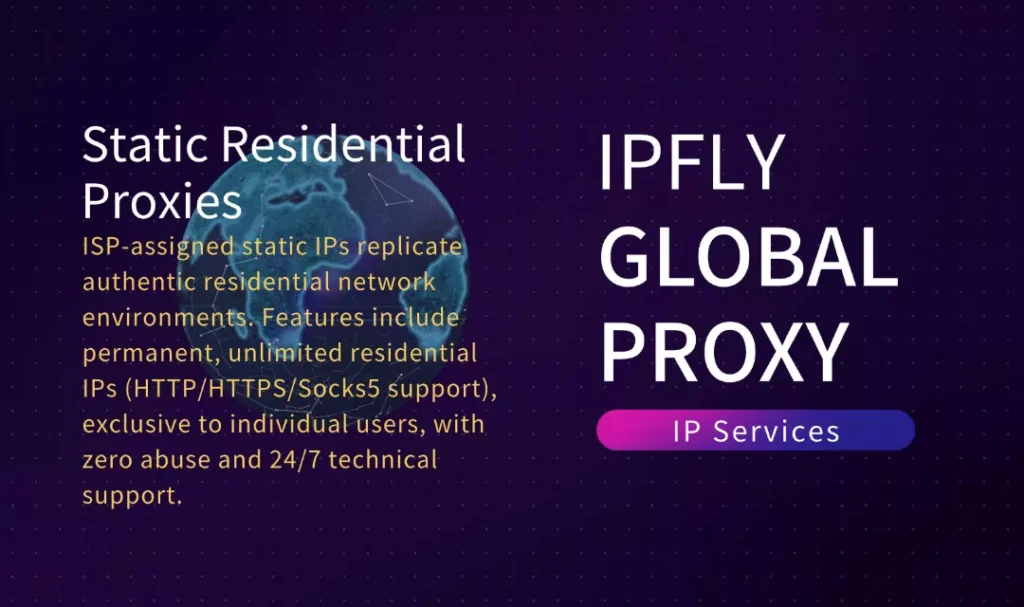In the dynamic, ever-shifting world of the internet, where digital identities can seem fleeting, there is a powerful tool built for the exact opposite purpose: stability. While many online tools are designed to change your identity, the static IP proxy is designed to keep it consistent.
But what exactly is a static proxy IP, and why is a stable, unchanging digital address so valuable? This popular science tutorial will explore the fascinating science of the static IP proxy, how it differs from its rotating cousin, and the critical tasks where its consistency is not just a feature, but a necessity.

The Dedicated Line – The Science of a Static IP
First, let’s understand the core concept. A static IP proxy, also known as a fixed or dedicated IP proxy, is an intermediary server that provides you with a single, unchanging IP address. Every request you make and every session you start will originate from this exact same IP address, day after day.
To understand its significance, let’s use an analogy:
A rotating proxy is like using a different, random public phone booth for every single call. This is great for anonymity, as your calls can’t be traced back to one location.
A static IP proxy is like having your own private, dedicated phone line with a number that never changes. When you call someone, they recognize your number, know it’s you, and trust the call.
This consistency is the scientific principle that makes static proxies essential for tasks that require trust, recognition, and reliability.
Static vs. Rotating Proxies: A Tale of Two Tools
Choosing between a static and a rotating proxy depends entirely on your scientific objective. The two are designed for opposite, yet equally important, purposes.
| Feature | Static Proxy | Rotating Proxy |
| IP Address | Fixed, does not change. | Changes with every request or on a timer. |
| Primary Benefit | Consistency, Trust, Reliability. | Anonymity, Scale, Ban Evasion. |
| Best Use Case | Account management, accessing whitelisted IPs. | Large-scale web scraping, market research. |
| Session Type | Long-term, persistent sessions. | Short-term, discrete requests. |
You need a static IP proxy when the online service you are interacting with is scientifically designed to value a consistent and recognizable identity.
Critical Use Cases for a Static IP Proxy
While rotating proxies are built for harvesting data, static proxies are built for management and secure access.
1.Managing Social Media and Online Accounts
Platforms like Instagram, Facebook, Google, and Amazon are scientifically tuned to detect unusual login behavior. Accessing an account from a constantly changing IP address is a major security red flag. A static IP proxy ensures that you always log in from the same trusted address, building a history of legitimate access and reducing the risk of triggering security checks or account locks.
2.Accessing IP-Whitelisted Networks
Many businesses and secure online services use IP whitelisting as a core security principle. This means only a pre-approved list of IP addresses can access their network or database. A static IP proxy gives you a fixed address that you can provide to an administrator to be placed on this “digital VIP list,” guaranteeing you secure remote access.
3.Secure Online Banking and E-commerce
Financial institutions have sophisticated systems to monitor for fraud. A login from a new or unrecognized IP address can trigger alerts. Using a dedicated static IP for these sensitive transactions ensures your access patterns remain consistent and trusted.
4.Consistent Website Testing
Developers need a stable baseline to scientifically test how a website or application functions. A static IP provides this consistency, allowing them to test user experience, ad targeting, and geo-specific features without the variable of a changing IP address.
Finding a Reliable and Trusted Connection
The quality of your static proxy depends entirely on your provider. The source of the IP (whether from a datacenter or a residential ISP) and its exclusivity are key scientific factors.
When your task demands the highest level of trust, such as managing a high-value online account, sourcing your proxy from a top-tier provider is critical. A service like IPFLY, for example, can offer high-quality static residential proxies. These provide the perfect blend of a consistent, unchanging IP address with the legitimacy of a real Internet Service Provider, making them ideal for sensitive applications where security and a stable digital identity are paramount.
Start now! Visit IPFLY.net to experience excellent proxy services and join the IPFLY Telegram community for the latest strategies—master cutting-edge tips and exclusive resources, and let proxies efficiently empower all your needs!

The Power of a Stable Identity
A static IP proxy is a specialized scientific instrument for a digital world that, despite its chaos, often relies on trust and consistency. By providing a stable, reliable digital identity, it enables secure account management, grants access to protected networks, and ensures dependable testing. In a world of constant change, the science of stability can be the most powerful tool of all.


